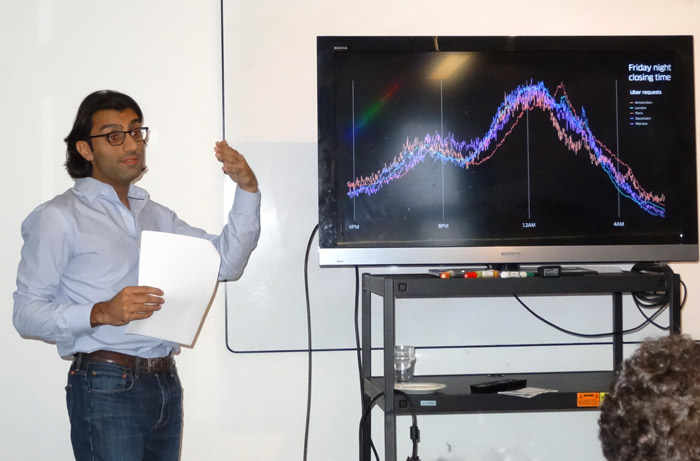On March 29, Quartier de l’Innovation Students’ Society (QISS) held its fourth Innovation Seminar Series, titled Cities of the Future. Speakers Virinder Kudhail, Soliman Abu-Samra, and Béatrice Couture presented their views on urban development and what it may look like in the future.
Virinder Kudhail is currently a Senior Operations Manager at Uber. Since graduating from McGill University in 2009 with a Bachelor’s of Commerce in Finance, Kudhail has been a central player in helping launch Uber in Montreal and became its first Operations Manager here.
“Ultimately, the way cities are designed now actually encourages car ownership, rather than encouraging people to use public transportation options,” Kudhail said. “We’re not building cities around our own needs or the environment, we’re actually building it around vehicles.”
According to Kudhail, Uber follows the trends of affordability and accessibility that can be found in all transportation networks.
“We’re trying to get to a point where people are using multiple modes of transportation, whether it’s ridesharing or public transit,” Kudhail said. “We can use these shared modes of transportation to reduce the number of cars on the road, the CO2 emissions, give back people time, and give cities space back.”
One way Uber can use its information to collaborate with cities is through Uber Movement, Uber’s central information website that launched in January 2017. It allows the public to access Uber’s trip data and researchers or city regulators have the opportunity to consult that information when making transportation policies, construction plans, and operational decisions.
Soliman Abu-Samra is the president of the Graduate Students’ Association (GSA) at Concordia University, and currently finishing his PhD in Civil Engineering. His doctoral research is primarily focused on infrastructure asset management.
According to Abu-Samra, in the past few decades, there has been a noticeable infrastructure budget deficit in Canada. This is a direct result of low investments from GDP to infrastructure between 1980 and 2000, which the Canadian government has been working to make up for in the past decade.
“Today’s decision frames the future of our city’s infrastructure,” Abu-Samra said. “[The] future of infrastructure is at risk […] It’s our responsibility as end users and taxpayers to take care of our infrastructure and inform the government whenever we see a low quality of service.”
An increasingly popular solution is to use new technological innovations to aid in infrastructure improvement. One project Abu-Samra would like to see happen is the implementation of smart real-time monitoring systems that assess buildings and pipelines at certain times and create alerts whenever repairs or improvements are needed.
Béatrice Couture is a general manager at InnoCité MTL, Canada’s first smart city accelerator. Smart city accelerators aim to turn start-ups dedicated to urban improvement into mature companies by connecting entrepreneurs with private partners.
Couture spoke about the importance of collaboration between cities and their citizens, as municipal governments often have difficulty resolving internal issues and usually don’t have the time or skills to unilaterally improve the lives of the city’s residents.
“Cities are not good at everything,” Couture said. “In order for cities to become customer-service oriented and citizen centric […] we need young innovators that will come up with solutions that will be exactly what the citizens want.”
One example of this is “Transit,” which is a real-time app in which mobile users can track the exact location of their buses, or subway, and metro trains. This app was developed before the Société de Transport de Montréal (STM) was able to offer a similar service.
Couture emphasized the important relationship between technology and the future of urban development mobility.
“The cities of the future are gaining soft skills, which leaves [the citizens] to benefit from it,” Couture said. “It’s a huge opportunity and there’s a lot still to be done.”








